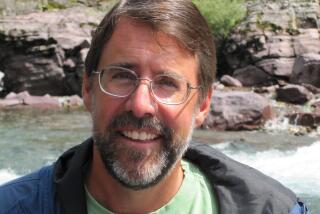NONFICTION - July 10, 1994
- Share via
BECOMING NATIVE TO THIS PLACE by Wes Jackson (The University Press of Kentucky: $20; 121 pp.) There are a few writers, thinkers and scientists, like Wes Jackson and his friend Wendell Berry (whose praises are sung throughout “Becoming Native”), who try periodically to readjust our way of seeing our relationship to nature. They believe that, without some vision of that relationship, efforts such as recycling and what Jackson somewhat sarcastically calls “smart resource management” are not deep enough to head off a fast-approaching disaster. These are my words, not Wes Jackson’s, who, I am sure, approves of recycling. Jackson writes from his home in Kansas, where he sees evidence of generations abandoning their rural homes for the city and farmers increasingly unable to use and live with the land the way their ancestors could. “The universities,” he writes, “now offer only one serious major: upward mobility.” Science, with its Cartesian focus on the parts, not the whole, assures its smug practitioners that “the world operates by the same method they use to study it.” Descartes contributed the assumption that “humans are the . . . only real repository of mind and consciousness.” Kant contributed the “notion that our senses tell all. . . . Any other possible realities behind or beyond our senses can never be known.” What can we do? Jackson is not long on suggestions. “America does not need jobs that depend on an extractive economy,” he tells us. “We could begin by accepting our profound ignorance,” he tells us. I nod vigorously all the way through this book, as I always do with Wendell Berry. I am grateful for the reminder. But I worry that books like this make us comfortable with our own demise. When we are shrieked at and made fun of for our wasteful unconscious ways some door slams shut, and we settle in for the long sleep.
More to Read
Sign up for our Book Club newsletter
Get the latest news, events and more from the Los Angeles Times Book Club, and help us get L.A. reading and talking.
You may occasionally receive promotional content from the Los Angeles Times.










